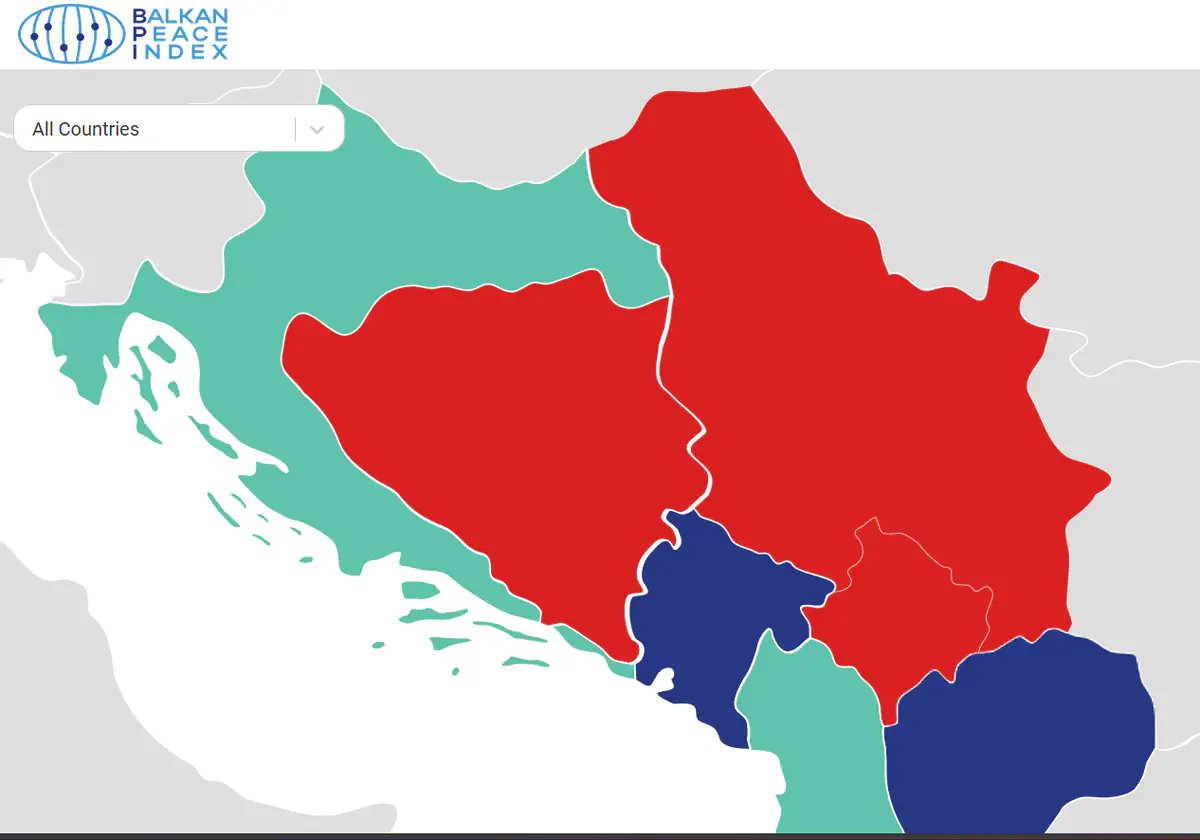Balkan Peace Index
Monitoring and Indexing Peace and Security in the Western Balkans - MIND Project
 Image credit: MIND Project
Image credit: MIND ProjectI’m pleased to annouce to share the Balkan Peace Index (BPI) with you. The project was developed as part of the MIND project, which is funded by the Science Fund of the Republic of Serbia. The project aims to bust the myths about the Western Balkans as a perpetual “powder keg” and to provide local and contextual knowledge about security cooperation and peace dynamics in the region. A great thanks goes to the entire team for their hard work - Nemanja Džuverović (FPN), Filip Ejdus (FPN), Đorđe Krivokapić (FON), Goran Tepšić (FPN), Marko Kovačević (FPN), Violeta Beširević (UNION), Tatjana Papić (UNION), Miloš Vukelić (FPN), Tijana Rečević (FPN), Aleksandar Milošević (FPN), Sanja Vojvodić (FPN), Jelena Pejić Nikić (FPN), and Milan Varda (FPN).
For more details and interactive analysis, visit our web application: Balkan Peace Index.
Balkan Peace Index
The Balkan Peace Index is a novel metric designed to measure peacefulness across seven Western Balkan countries. This index diverges from traditional peace indices by integrating both quantitative and qualitative data through a synthesis of Decision EXpert methodology and ethnographic approaches, aligning with the “local turn” in peace and conflict studies.
This methodology emphasizes local involvement and contextual knowledge, offering a culturally and contextually informed perspective of regional peace. The BPI provides actionable insights for policymakers and enriches peace research methodology by offering a classification-based approach rather than simple rankings or scores. The transparency of the index is a core principle, ensuring that all data, models, and results are publicly accessible through a dedicated web application, allowing external validation and broad usage.
Methodology and Approach
Unlike conventional peace indices such as the Global Peace Index, which primarily rely on numerical rankings, the BPI employs the Decision EXpert methodology (DEX) to incorporate both quantitative and qualitative data. This method captures local perspectives, addressing gaps in conventional peace measurement methodologies that often overlook regional specificities and lived experiences.
Our peace classification method seeks to provide policymakers with a detailed understanding of peace on a continuum, rather than as a binary outcome or a static ranking. By distinguishing between negative peace (absence of violence) and positive peace (presence of justice and equality), the classification system offers a more nuanced interpretation of peace dynamics in the region. This methodology aligns with contemporary critical peace studies (Mac Ginty & Richmond, 2013; Džuverović, 2021) and ensures that peace is assessed within its cultural and historical context.
Advantages of a Peace Classification System
- More Actionable Insights: By categorizing peace rather than assigning a numerical rank, the BPI helps policymakers understand where interventions are needed.
- Contextual Relevance: Unlike global indices, the BPI is specifically designed to account for regional dynamics and local perspectives.
- Flexibility and Adaptability: The classification system can be updated to reflect new insights, making it a valuable ongoing policy tool.
- Encouraging Regional Dialogue: By offering a comparative but non-competitive framework, the BPI fosters international collaboration in peacebuilding efforts.
Data and Transparency
All data used in the BPI is available for public access and validation.
You can explore the data and methodology here: Mendeley Data Repository.
The Balkan Peace Index aims to serve as a cornerstone for policymakers, researchers, and practitioners working towards sustainable peace in the Western Balkans. We encourage engagement, feedback, and collaboration in refining this model to ensure its effectiveness and relevance in shaping peace-oriented policies.